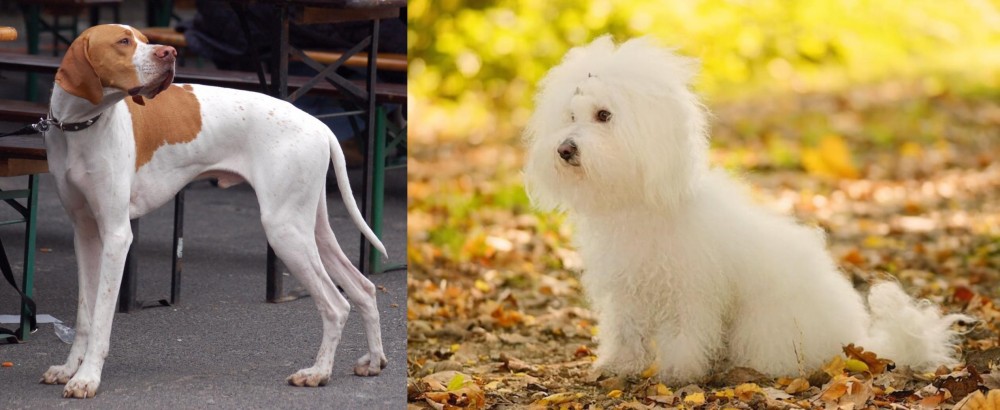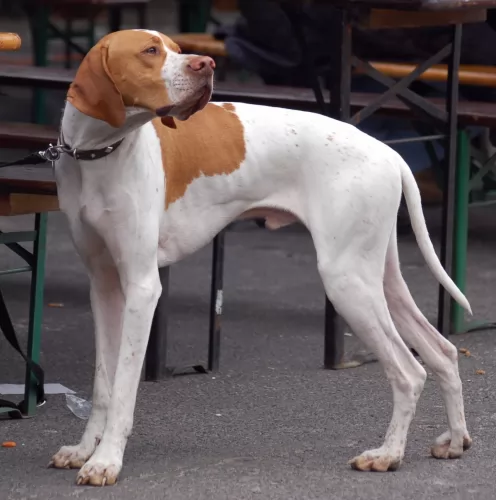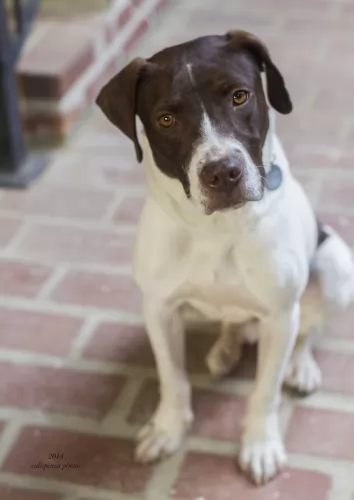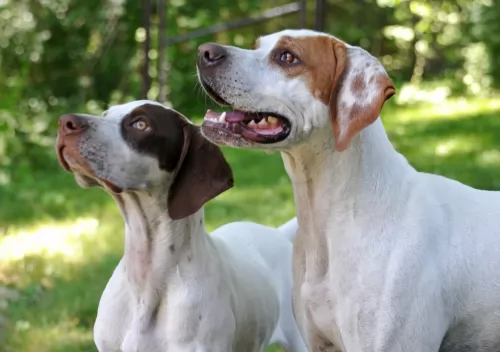 Petzlover
Petzlover English Pointer is originated from United Kingdom but Bichon Bolognese is originated from Spain. English Pointer may grow 66 cm / 26 inches higher than Bichon Bolognese. Both English Pointer and Bichon Bolognese are having almost same weight. Both English Pointer and Bichon Bolognese has almost same life span. English Pointer may have more litter size than Bichon Bolognese. Both English Pointer and Bichon Bolognese requires Low Maintenance.
English Pointer is originated from United Kingdom but Bichon Bolognese is originated from Spain. English Pointer may grow 66 cm / 26 inches higher than Bichon Bolognese. Both English Pointer and Bichon Bolognese are having almost same weight. Both English Pointer and Bichon Bolognese has almost same life span. English Pointer may have more litter size than Bichon Bolognese. Both English Pointer and Bichon Bolognese requires Low Maintenance.
 We can find records for pointers from 17th century. Breeds such as Old Spanish and Portuguese Pointer were set in to England from European Mainland. In 1800s they were brought to America and then they slowly developed their hunting skills and in 1910 they became an excellent bird hunter. In 1936 Modern American Kennel was established and they bred pointers in large quantities. They are very popular in southern United States and are called as "bird dog". Pointers are good in hunting birds like pheasant and grouse. They got their name because of their special skills in hunting.
We can find records for pointers from 17th century. Breeds such as Old Spanish and Portuguese Pointer were set in to England from European Mainland. In 1800s they were brought to America and then they slowly developed their hunting skills and in 1910 they became an excellent bird hunter. In 1936 Modern American Kennel was established and they bred pointers in large quantities. They are very popular in southern United States and are called as "bird dog". Pointers are good in hunting birds like pheasant and grouse. They got their name because of their special skills in hunting.
 The Bichon Bolognese is one of 4 types of Bichon breeds the others being the Havense, the Bichon Frise and the Maltese. The Lowchen and the Coton de Tulear are also listed in this grouping at times. The Bolognese was developed in Italy and is a small, companion animal. They are named after the city of Bologna in Northern Italy. The Bichon Bolognese is considered a toy dog and are considered an ancient breed that lived with Italian nobility. Their precise ancestry is not known and the Maltese is considered its closest relative. They have been known to exist since at least 1200.
The Bichon Bolognese is one of 4 types of Bichon breeds the others being the Havense, the Bichon Frise and the Maltese. The Lowchen and the Coton de Tulear are also listed in this grouping at times. The Bolognese was developed in Italy and is a small, companion animal. They are named after the city of Bologna in Northern Italy. The Bichon Bolognese is considered a toy dog and are considered an ancient breed that lived with Italian nobility. Their precise ancestry is not known and the Maltese is considered its closest relative. They have been known to exist since at least 1200.
The Bichon Bolognese is found in many works of art throughout the centuries. They were the favorite of many an Italian artist since the 17th century including Titian, Watteau, Gosse and Goya. They were known to be owned by Duke Frederico Gonzaga, Madame De Pompadour, Catherine the Great of Russia and Empress Maria Theresa of Austria. Cosimo de Medici gave eight Bolognese to Belgian noblemen. The Duke d’Este was given two as a gift.
Of all the Bichon group – the Bolognese is the hardest to find and the best problem solver. They read body language amazingly well, stick with their owners and are attentive and devoted. Liz Stannard brought them to England in 1990 and they were entered in the breed registry that same year and joined the show ring cycle in 2001. By 2002 they were shown at Crufts, England’s International Dog Show.
 Pointer has a long head and its body is perfectly suitable for hunting. In hunting the pointers shows hunter the direction of the bird and also they will go and get them after they were shot. They are well known for their speed, energy and continuous working. Pointers are also a good companion dog and love the family members so much. It is very easy to groom them as they have short coat. They are very alert and excellent watch dog.
Pointer has a long head and its body is perfectly suitable for hunting. In hunting the pointers shows hunter the direction of the bird and also they will go and get them after they were shot. They are well known for their speed, energy and continuous working. Pointers are also a good companion dog and love the family members so much. It is very easy to groom them as they have short coat. They are very alert and excellent watch dog.
If pointer is not set in huntng then they should be given lots of exercise daily. Pointers love to play and run with children. They will give a good company for cyclists. Pointers show their talents in dog shows especially in obedience and field trials. They will not worry about the crowd surrounding them and performs well. In performing at public, pointer will show perfect attention to its master. Pointer must be trained slowly from its puppyhood to get good results.
 Like the other members of the Bichon group, the Bolognese is a compact, little white dog. It is considered a member of the toy group and is stocky in its build. It is a muscled, square dog of medium length with an ovoid skull and large, square, black muzzle. The jaw is well developed, and they have black lips, black nose and black eyelids. They have a straight muzzle with a strong, aligned bite and its eyes are round and wide. They have long, high set ears that hang down to a rigid base. The coat is white, long and shorter only at the muzzle. The coat is fluffy but not fringed.
Like the other members of the Bichon group, the Bolognese is a compact, little white dog. It is considered a member of the toy group and is stocky in its build. It is a muscled, square dog of medium length with an ovoid skull and large, square, black muzzle. The jaw is well developed, and they have black lips, black nose and black eyelids. They have a straight muzzle with a strong, aligned bite and its eyes are round and wide. They have long, high set ears that hang down to a rigid base. The coat is white, long and shorter only at the muzzle. The coat is fluffy but not fringed.
 Pointer is a wonderful kid friendly dog and a nice companion. Also he is very energetic,fun-loving and an excellent watchdog. Pointers are very courageous as well as obedient. They can work for a very long time. Early socialization will make them with a good behaviour.
Pointer is a wonderful kid friendly dog and a nice companion. Also he is very energetic,fun-loving and an excellent watchdog. Pointers are very courageous as well as obedient. They can work for a very long time. Early socialization will make them with a good behaviour.
They will be happy if they are given a fenced yard to play and spend their natural energy. They will not have a good behaviour in apartment living. Pointers always likes to be with some one in his family. They are suitable for areas having hot weather and they will not do better in cold weather.
Pointers have very high intelligence and thus they are very easy to train. Good behaviours must be taught to them and the main word they must learn is "NO". They should stop what they are doing when they hear the word "NO" from you. "Sit" is another important word they should learn. Training should be given friendly and not compelling them to do it. Giving reward to them will make them happy and give more interest in training.
 These little white dogs with the shaggy hair are intelligent, loving, playful, loyal, and happy to do whatever you ask them to. They are more reserved than their relative the Bichon Frise. They are great at obedience training and seem to love it. They learn quickly and love to please you, yet they can also be very stubborn. Like the Bichon Frise, they are difficult to housebreak. They need to be with their people who they will develop bad habits and a bad attitude. They are bred to be companion dogs. If socialized when young they are great with strangers after you have indicated that the strangers are ok. They are barking watchdogs but not continuous barkers. They get along with other dogs but are ok by themselves as well. They do get separation anxiety when their people are gone for extended periods of time. They can be very serious and docile, but they love to be with people. They are very loyal and very bonded to their family.
These little white dogs with the shaggy hair are intelligent, loving, playful, loyal, and happy to do whatever you ask them to. They are more reserved than their relative the Bichon Frise. They are great at obedience training and seem to love it. They learn quickly and love to please you, yet they can also be very stubborn. Like the Bichon Frise, they are difficult to housebreak. They need to be with their people who they will develop bad habits and a bad attitude. They are bred to be companion dogs. If socialized when young they are great with strangers after you have indicated that the strangers are ok. They are barking watchdogs but not continuous barkers. They get along with other dogs but are ok by themselves as well. They do get separation anxiety when their people are gone for extended periods of time. They can be very serious and docile, but they love to be with people. They are very loyal and very bonded to their family.
Be sure you are the pack leader as they can acquire Small Dog Syndrome. With this syndrome the dog comes to believe he is the alpha and the humans are his pack. This causes many kinds of problems with behavior including howling when not getting attention, their separation anxiety and destructiveness can also come from this.
 Pointers face health problems such as gastric torsion, hypothyroidism and canine hip dysplasia. Overweight will also lead to many health problems in them. Other problems seen in them are cardiomyopathy, ectropion and progressive retinal atrophy.
Pointers face health problems such as gastric torsion, hypothyroidism and canine hip dysplasia. Overweight will also lead to many health problems in them. Other problems seen in them are cardiomyopathy, ectropion and progressive retinal atrophy.
They have the chances to get several skin disorders which leads to hairfall. Follicular Dysplasia is a hereditary disorder which causes hairfall. Special shampoos or lotion to combat the dry skin should be used to overcome this problem.
 Normally puppies require more food when compared with adult to meet their growth needs. The food given to the pointer puppy must contain vitamins, carbohydrates and minerals. Also the food given to his mother should be continued to the puppy as to avoid digestive problems for the puppy. If it is needed to change the food then it should be done in a step by step process.
Normally puppies require more food when compared with adult to meet their growth needs. The food given to the pointer puppy must contain vitamins, carbohydrates and minerals. Also the food given to his mother should be continued to the puppy as to avoid digestive problems for the puppy. If it is needed to change the food then it should be done in a step by step process.
Pointer can be fed one or two times a day. Usally small meal is given in morning and full meal will be given in the evening. But in case if they will be left alone for the whole day then morning food shall be a full meal. They can be fed meat of goat, pork, fish and woodcock. Brown rice is a good food for pointer.
Pointers will be happy if they are always with their family. They enjoy when they are taken outside for playing or camping. Puppies don't need much exercise as adults need. Adults should not be fed too much as it will lead to overweight.
When pointer is given proper exercises and training they will be a very good mannered dog. They are very active and intelligent dogs and hence require exercise and training regularly. The breed was developed to be a hunting dog and can work continuously in a day. Pointers should be exercised a minimum of an hour per day. They will be happy to run along with your bicycle and playing frisbee with you.
 Like other toy breeds do not overfeed the Bolognese. Feed them ¼ of a cup of high quality dry food once a day. Treats are often used for training just be judicious with them.
Like other toy breeds do not overfeed the Bolognese. Feed them ¼ of a cup of high quality dry food once a day. Treats are often used for training just be judicious with them.
They are very healthy with a propensity toward: Moving kneecaps (Luxating patella)
Legg-Calve-Perthes Disease – This causes the thigh bones to shrink due to a loss of blood supply. It can be repaired surgically.
Periodontal Disease due to their small mouth size.
They need to walk everyday but they can be couch potatoes. One long 20-minute walk will do or a couple 10-minute walks.
While Bolognese are perfectly happy to lounge around the house, they should also have a daily walk.[7] A suitable walk would be around 20–25 minute a couple of times a day or substitute 10-minute walks a few times a day. They love to play off-lead, whether its in the house or in a fenced in yard or dog park.